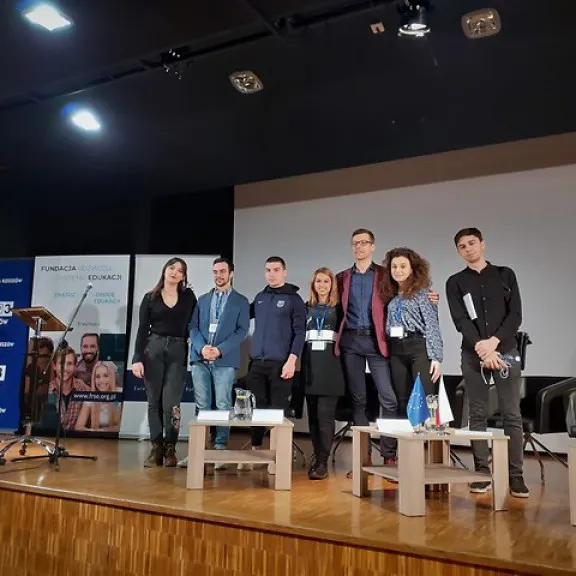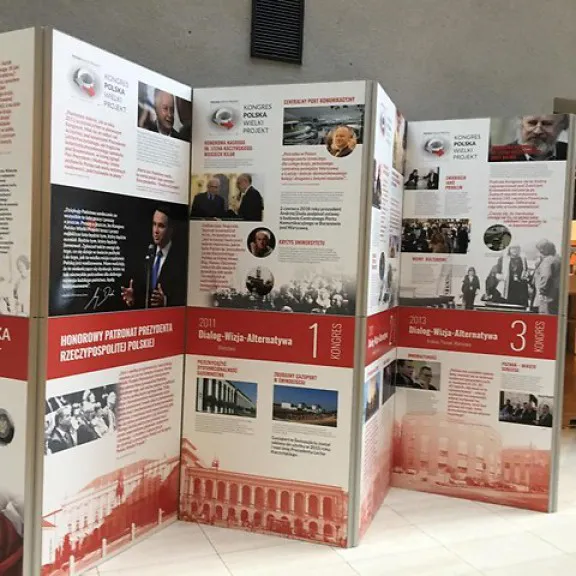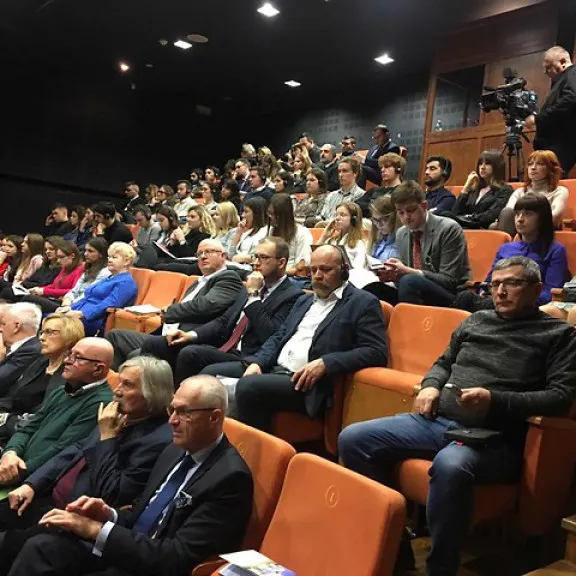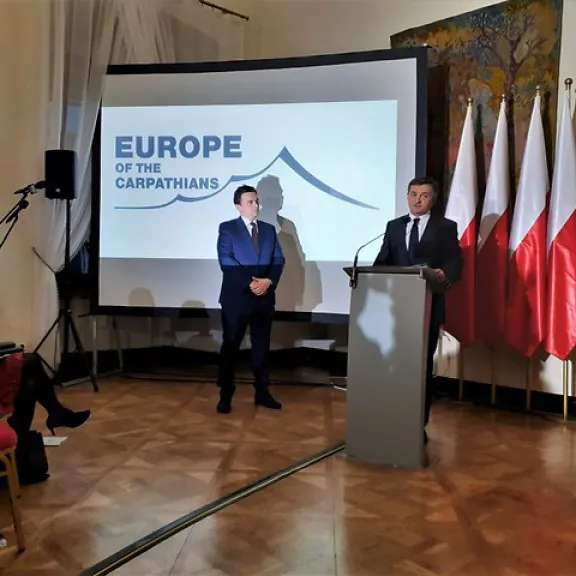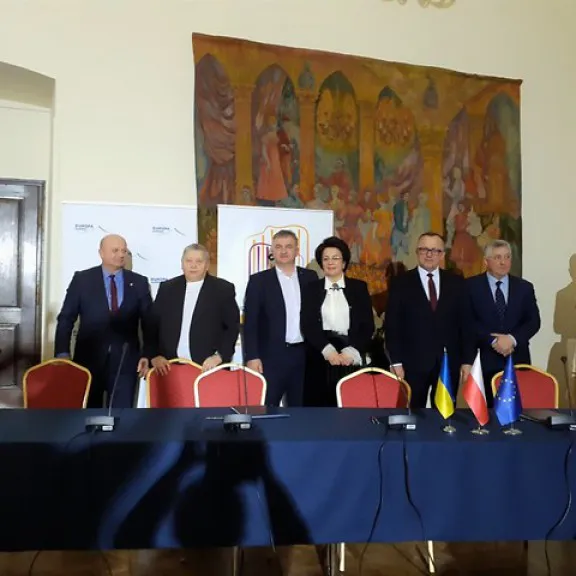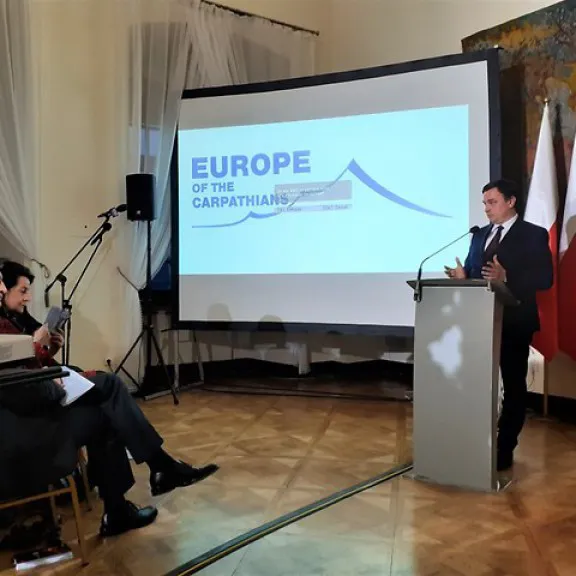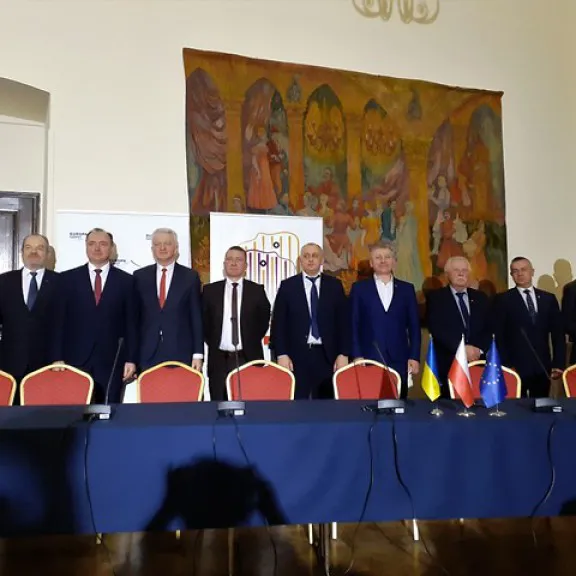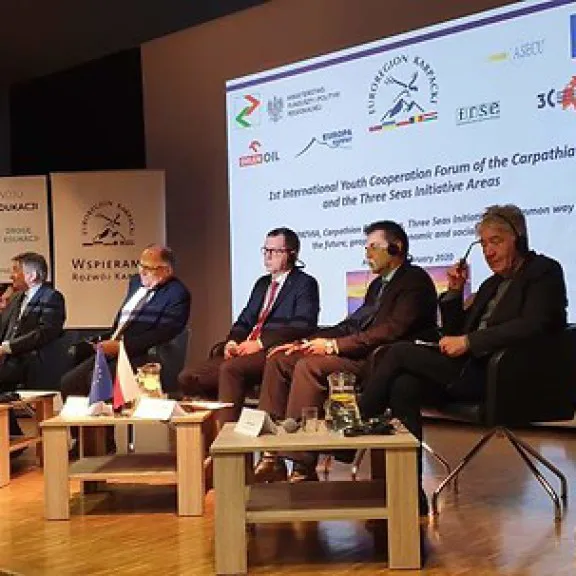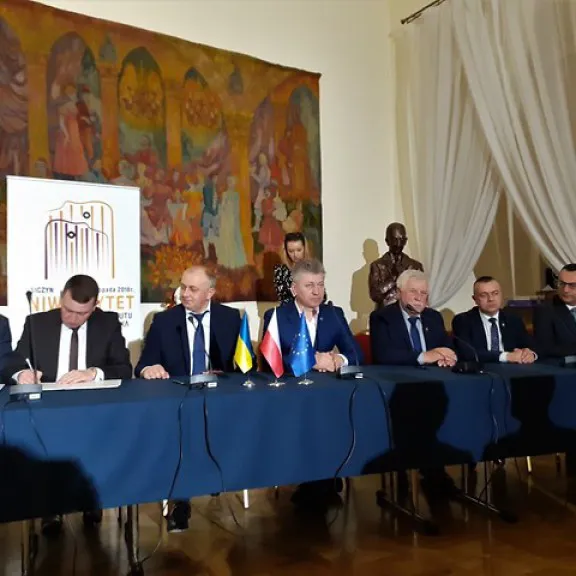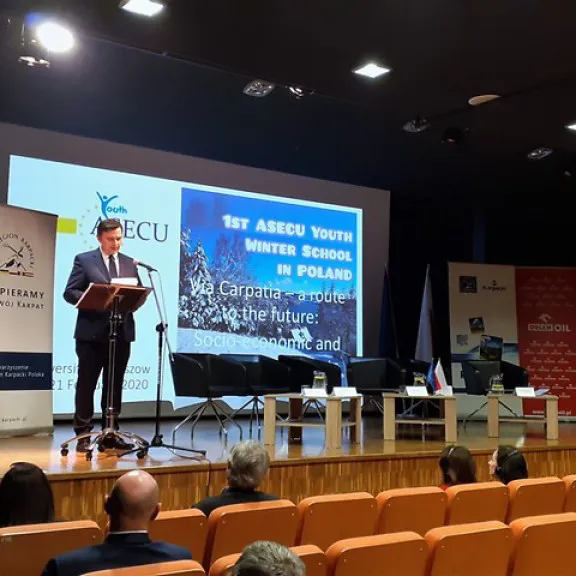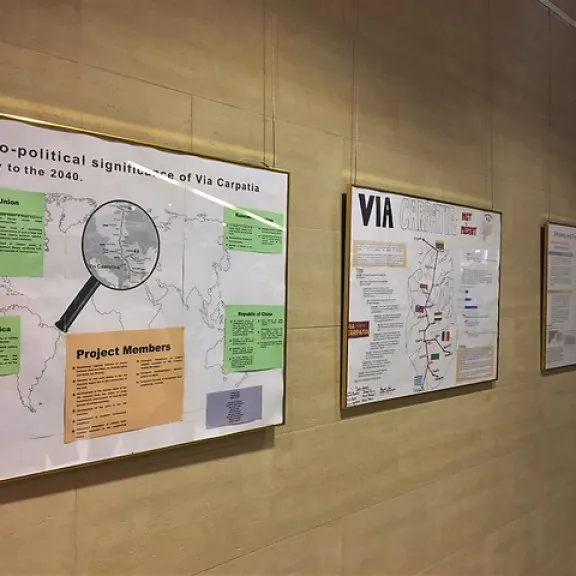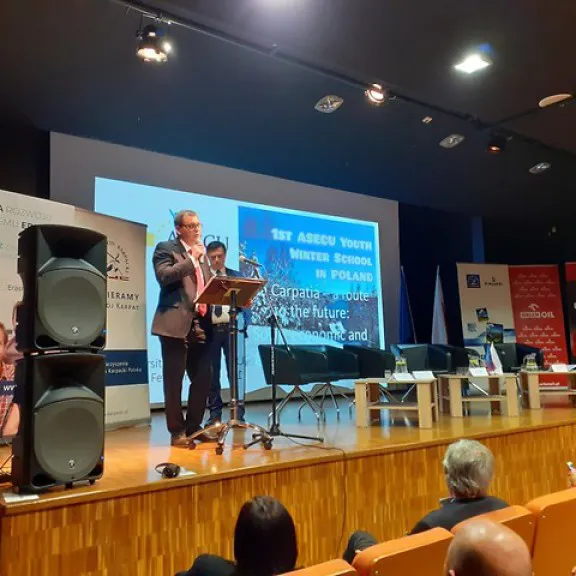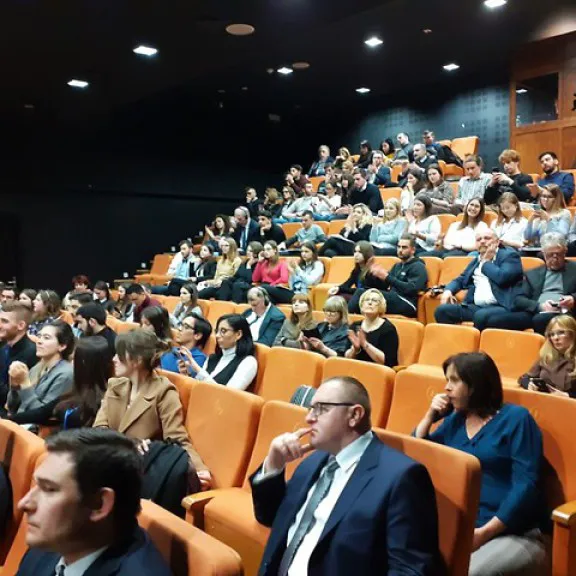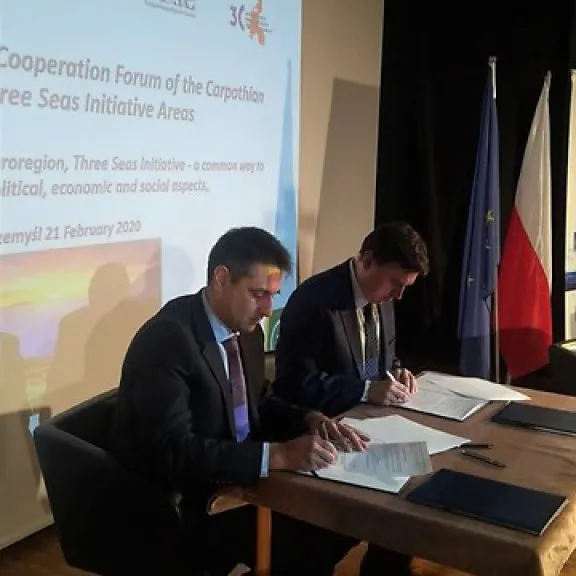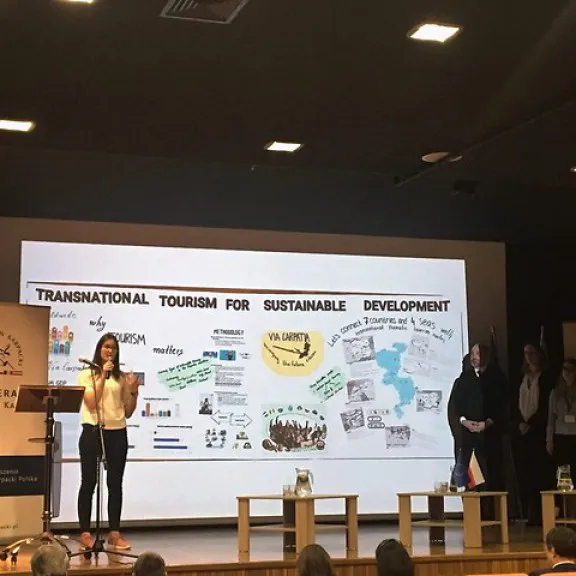
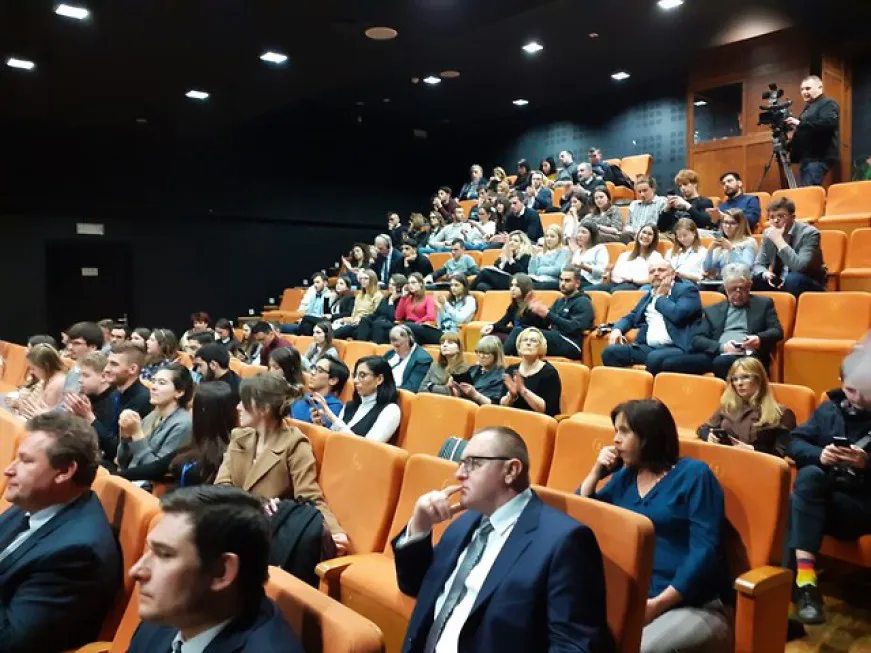
1st International Week of Cooperation in the Carpathians
Last week was devoted to international cooperation in the Carpathians. As part of it, a series of events devoted to the subject of the Carpathians and the development of the region was held.
On February 21 this year. at the National Museum of Przemyśl Land, the 1st International Forum of Young Collaboration in the Carpathian Area and the "Three Seas Initiative" initiative was held. "VIA CARPATIA, Carpathian Euroregion, The Three Seas Initiative - a common path to the future, geopolitical, economic and social aspects"
The forum was one of the events organized as part of the "Europe of the Carpathians" Conference prepared by the Sejm of the Republic of Poland. It was organized by the Association of the Carpathian Euroregion Poland and the Association of Economic Universities of Southern, Eastern Europe and the Black Sea Region under the patronage of the Minister of Funds and Regional Policy, Mrs. Małgorzata Jarosińska-Jedynak, with the support of Marshal Marek Kuchciński, Foundation for the Development of the Education System, ORLEN OIL in cooperation with The National Museum of Przemyśl and the University of Rzeszów.
The aim of the Forum was to exchange experiences between representatives of universities (students, staff) from the countries of Eastern, Southern and Central Europe, as well as developed solutions for synergy between territorial initiatives: the Carpathian Euroregion, the VIA CARPATIA trail and the Three Seas Initiative. Panellists - representatives of universities, politicians, entrepreneurs talked about the challenges for the next decade and presented proposals for solutions to improve development cooperation.
During the session "From cooperation to integration - foundations of a common socio-economic space in Central and Eastern Europe", the initiatives that have emerged in recent years in the area of Central and Eastern Europe were analyzed, aimed at supporting the mechanisms of cooperation of entities from many sectors for the socio-economic development in different fields. During the panel, representatives of the world of politics, science and business from various countries exchanged views on the assessment of the state of cooperation in Central Europe and its connections with the outside world. Proposed actions are presented, aimed at creating synergy between initiatives and maximizing their use, as well as changing the approach from project to system.
During the session "Three Seas Youth for Europe of the Carpathians - challenges of the 2020-2030 period. Strategy, structure and forms of cooperation ", the results of the workshops that took place as part of the ASECU Winter School in Polańczyk on February 17-20 this year, organized by the Association of Economic Universities of Southern, Eastern Europe and the Black Sea Region (ASECU) with the participation of the Carpathian Euroregion and the University were presented. Rzeszowski. During these days, lecturers, experts and students from Poland, Greece, Albania, Serbia, Montenegro, Bulgaria, Romania, Turkey, Russia, Ukraine, Austria and Germany, within thematic groups, discussed the future of the region, focusing on the most important topics, such as : geopolitical conditions for the area and international situation, regional development, opportunities and barriers to economic growth, environmental protection, ecology and climate changes, energy policy, including renewable energy, security, development of border areas and cross-border cooperation, functional connections within the Carpathian area and Initiative Three seas, tourism, education, and research and scientific cooperation.
As part of the workshops, specific postulates and proposals for international cooperation projects for universities and youth from the Carpathian and Three Seas Initiative areas were developed. The result of the work was the creation of posters related to the individual thematic scopes of the workshops, i.e.
History of Southeast Europe as a common socio-economic and cultural area.
- The history of Via Carpatia, the Carpathian Euroregion and the Three Seas Initiative and the current state of implementation.
- Technical, institutional and financial issues of Via Carpatia, the Carpathian Euroregion and the Three Seas Initiative
- The importance of Via Carpatia, the Carpathian Euroregion and the Three Seas Initiative for trade relations in the region.
- The importance of Via Carpatia, the Carpathian Euroregion and the Three Seas Initiative for financial mobility and interregional investments.
- The importance of Via Carpatia, the Carpathian Euroregion and the Three Seas Initiative for interregional tourism and the tourist attractiveness of the region.
- Via Carpatia, the Carpathian Euroregion and the Three Seas Initiative and cultural connections / intercultural communication in the region.
- Geopolitical importance of Via Carpatia, the Carpathian Euroregion and the Three Seas Initiative.
The results of the teams' work were presented during the second panel and posters that were presented during the Forum.
During the next session, entitled "Through the Carpathians - building research and academic cooperation structures in the area of the Carpathians and the Three Seas Initiative. Overview of initiatives ", the opportunities brought by the development of a cooperation network of universities and research and development institutions were analyzed on the example of the activity of ASECU, which is an international cooperation network of over 40 universities from several countries. Together with the Carpathian Euroregion, it took up the challenge of developing this network in the Carpathian format and under the auspices of the "Three Seas Initiative". Issues related to the possibilities of developing such a cooperation system that its operation would bring effects for other related stakeholders in the Carpathian and "Three Seas" areas were discussed. An efficiently operating system ensures effective intersectoral cooperation between the world of science, research and development centers, administration and business. Coordination of development policies conducted by governments in the area of cooperation plays a special role. As a result of the panel discussion, strategic goals for cooperation between science institutions and academia were identified, along with an outline of the cooperation system between them and other actors of development policies.
During the Forum, there was also a ceremonial signing of a cooperation agreement between the Association of the Carpathian Euroregion Poland and the Association of Economic Universities of Southern, Eastern Europe and the Black Sea Region (ASECU), the aim of which is to create a system coordinating cooperation between academia and partners in the public, private and non-governmental sectors for development of the Three Seas Initiative area along the Via Carpatia route, including the Carpathians, and building external, international connections between them. Signing the agreement will improve cooperation, and thus better results of the implementation of joint tasks.
The Forum ended with an exhibition on the 10th anniversary of the Polska Wielki Projekt Congress. After its ceremonial opening, the following documentary films were screened:
- "Hiranmoy Ghoshal. The Current of Two Rivers", dir. Tadeusz Śarówka, 2019
- "Passports of Paraguay", dir. Robert Kaczmarek, 2018
We believe that the conclusions of the event and mutual cooperation will contribute to even better development of the region.
During the "Europe of the Carpathians" Conference, which took place on February 22-23 this year. At the Krasiczyn Castle, a Declaration was signed on the creation of the "Przemyska Gate" Cross-Border Functional Area. It is the third of the cross-border areas created by SEKP on the border of Poland, Slovakia and Ukraine (the former are "Kremenaros" and "Beskid Niski"). The declaration was signed by the Association of the Carpathian Euroregion Poland and 15 local government units from Poland and Ukraine (9 from Poland and 6 from Ukraine): Cross-border Functional Areas are new initiatives with great socio-economic potential.





